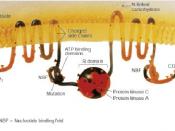Cystic fibrosis is a disease that affects the way salt and water move in and out of the body's cells. The main areas affected by this disease are in the lungs and the digestive system, mainly the pancreas. The sweat glands are also affected, which makes a saltier sweat than normal. Sweat is often used as a test to diagnose cystic fibrosis.
Cystic fibrosis is present at birth, although the signs may not show up for awhile after birth. The parents of a child with cystic fibrosis will not have it, and there is often no history of the disease in the family. It is most common among Caucasians, and is the most commonly inherited disease. It affects about 1 in 2,500 babies that are born.
The production of the protein that is affected by cystic fibrosis is called CFTR (cystic fibrosis transmembrane conductance regulator), which is important in the regulation of how much salt moves across the cell membrane.
For normal functioning of the lungs, there needs to be a certain amount of fluid and mucus lining the airways. The cells that line the smallest bronchi store the fluid and secrete it out onto the airway surface. Since the fluid is constantly moving upwards, toward the back of the throat, the cells in the larger bronchi absorb the fluid in order to keep the fluid lining thin along the airway.
Bronchial cells secrete fluid by allowing chloride to pass out through the membrane of the cells. The main protein channel for chloride to flow onto the surface of the airway is CFTR. The chloride ions carry a negative charge, and when the chloride ion crosses the CFTR, it pulls a positively charged sodium ion with it. This is the law of electrical neutrality, which says that the...


